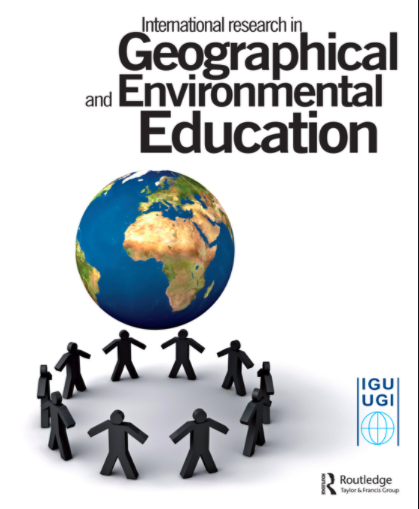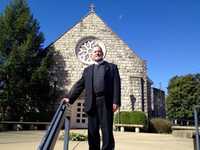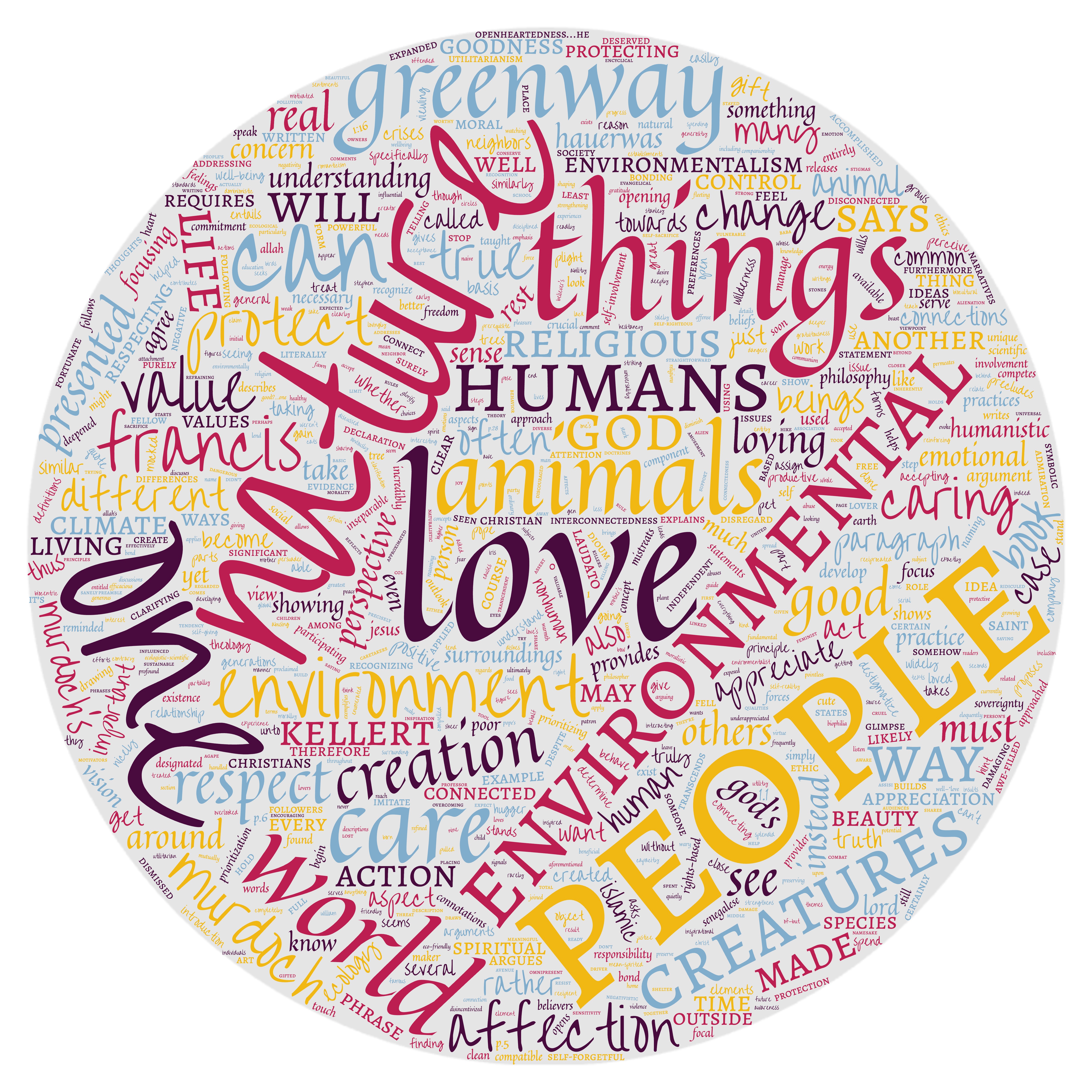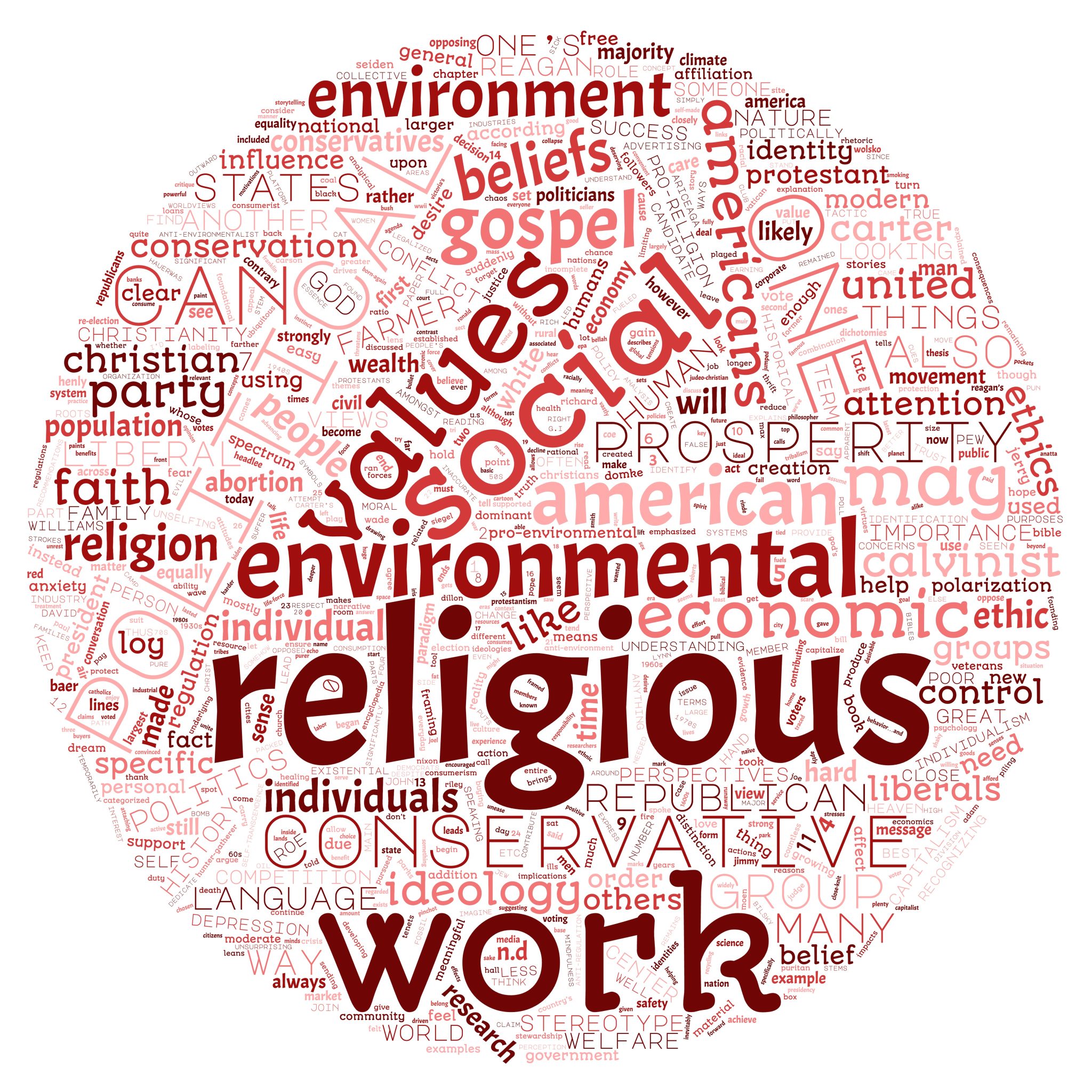Search
68 items
-
How do we Communicate Environmental Ethics? Reflections on Environmental Education from a Kuwaiti Perspective
Dr. Khadija al-Naki, an educational researcher, discusses Islamic thought in relation to environmental education. Comparing Islamic teachings with Western environmental ethics, al-Naki opens a conversation on how to develop an environmental curriculum in Islamic education systems. This article leaves the reader questioning the role of education in the environmental movement.
Published in the journal International Research in Geographical and Environmental Education. -
Manifesto for an Ecological Reformation of Christianity
This Manifesto by the World Council of Churches is a call to examine Christian practices that may be harmful to the Earth, humans, and other species. It urges individuals instead to focus on what various “eco-congregations” or “green churches” are doing. The following manifesto excerpt provides a rationale for the need for ecological reformation:
"The need for an ecological reformation of all Christian traditions is of course manifested in different ways in various parts of the world. The pain impulses associated with ecological destruction have been registered especially in those areas that lie on the periphery of current constellations of economic power. The call for an ecological reformation of Christianity has come with particular urgency from Christians in such areas (the Pacific, Africa, Asia, Latin-America) as they are more exposed and vulnerable. This call is echoed by churches which belong to (mainly protestant) countries in the global North which have contributed heavily to the exploitation of natural resources, industrial production and a style of consumption that causes environmental degradation." -
Wanted: Innovative Farmers to Help Slow Algal Bloom on Lake Erie
The Christian Science Monitor has written an article discussing how agricultural nutrients in the Maumee River, Lake Erie’s biggest source of pollution, are reaching record proportions. Most nutrient pollution is caused by large storms, and with climate change, these storms are becoming increasingly more common. The USDA reports that farmers are making headway toward reducing nutrient pollution on a voluntary basis, but many researchers say that these efforts are not sufficient. A recent report suggests additional outreach, an increased focus of conservation dollars, and mandated soil testing.
Wetland restoration – bringing back bits of the Black Swamp— can play a pivotal role in clearing algal bloom in Lake Erie. The Black Swamp Conservancy is currently working on turning 60 acres back into swamp in northwestern Ohio. William Mitsch, a retired Ohio State University professor and wetlands expert, hopes to eventually restore a tenth of the Black Swamp (about 100,000 acres) to provide a substantial cleaning of Lake Erie. -
Anamchara Faith Community Celebrates Earth Day 2016
This year, the Anamchara Faith Community will be providing an Earth Day celebration in the woods at Bernheim Forest in Bullitt County, Kentucky. The service will include biblical passages that give honor to the importance of trees, with the plan to plant at least one during this time. This service will draw from different faiths and cultures, ranging from the Catholic faith to Native American customs and traditions. -
Trees for the Earth
The Catholic community is joining with the Earth Day Network to help reach the goal of planting 7.8 billion trees by 2020. This would equate to one tree per person on earth. Pope Francis's recent encyclical, Laudato Si, focuses on the importance of trees and their benefits to the environment as well as human kind. -
Tu B’Shvat: Trees’ ReBirth Day
The Jewish festival of Tu B’Shvat, also known as the New Year for Trees, celebrates the ReBirthDay of earthly trees and of the sacred and supernal Tree of Life. The celebration begins on January 30th and ends January 31st. It is celebrated with a Seder in which the menu is the fruits and nuts that are given by the trees. As a special aspect of their climate-crisis work, The Shalom Center is inviting people to create a special Trees of Life Fund for reforestation in the US. -
Environmental Statement – American Baptist Churches
Environmental problems that exists today have stemmed from humanity’s current and past greed. Science and technology are being abused and threaten to make problems worse, even though they have the power to make things better. American Baptists advocate that we must be stewards of our home and not abuse it if we wish to continue on as a species. In order to fix what humans have caused, we are called to recognize and preserve the earth and natural resources we have. -
Environmental Statement – Church of the Brethren
The Bible is filled with examples that demonstrate our responsibility to care for all creation on our planet. From Genesis to the parables of Jesus, it is explicitly stated that we must be caring stewards of the earth. In order to reverse the damage that humankind has done, the Church of the Brethren is calling its own members and all people to action. In addition, they are also calling upon the government to be more supportive of environmental policies and clean up. -
Environmental Statement – Reformed Church in America
In 1982, the Christian Action Commission of the Reformed Church in America (RCA) released a document titled “Care for the Earth: Theology and Practice.” This was given to General Synod, who then passed several resolutions outlining the Reformed Church in America’s stance on environmental issues. The Action Institute wrote the article below that discusses the resolutions that were passed. -
Love and Environmentalism
This chapter from the student-written book “Emerging Perspectives on Religion and Environmental Values in America” explores how love and care impact how people interact with the environment, and how spirituality views and impacts this. It discusses how religion encourages love and how love encourages environmentalism, and how the three work together. Below is the first paragraph of the chapter to introduce the discussion.
"My mother had one general rule for me as I was growing up: to respect others, respect myself, and respect the environment. Obviously there were more rules that fell under this— 'clean the dishes after school' being one I was just as frequently reminded of—but they all fell under this principle in some form. This was also the basis of my environmental education: respecting the environment, showing it the care, love and awe that it deserved, was a fundamental aspect of our lives. Every time we would go outside or take a hike, I would be reminded not to touch anything I didn’t have to, to leave things the way I found them, and to appreciate the beauty of our surroundings. These ideas of respecting others and your surroundings are common themes in religious doctrines as well—'love thy neighbor' is a common refrain, and one that is often used in religious environmental arguments. As can be seen in many religious statements on environmental crises, protecting those less fortunate than yourself (respecting others) and protecting the gift of creation (respecting the environment) are the focal points of religious arguments in support of environmental action. Yet the love of nature is often underappreciated or overlooked when it comes to discussions of the environment, despite its universality. Perhaps because the concept is emotional rather than scientific, love is more easily dismissed as a weak persuader, but because it is so basic to humans it stands to be one of the more powerful forces we have available to us. As a common religious and moral value, the love and respect that people are asked to treat their surroundings with is a significant driver in environmentalism, both to better understand the environment and to create a sense of responsibility in preserving it." -
Origins of the Pro-Religion, Anti-Environmentalist Conservative Stereotype
This chapter from the student-written book “Emerging Perspectives on Religion and Environmental Values in America” explores the relationship between political affiliation and environmental values, as well as the stereotypes surrounding them. It examines how religion interacts with political views and the evolution of environmental values thoughout political and religious history. Below is the first paragraph of the chapter to introduce the discussion.
"The conception of someone who is 'anti-environment' usually evokes one of two images: 1) a fat cat in a suit, smoking a cigar while lining the pockets of the fossil fuel industry, or 2) a truck-driving rural American scoffing at the Prius-driving liberals in the cities who preach about their recycling practice. This chapter focuses on the second image...The distinction has been made clear in our minds: liberals care about the environment and conservatives don’t. This, along with another common conception that conservatives are religious while liberals aren’t, paints an inaccurate picture that drives religious conservatives out of the environmental conversation. How did this happen?" -
MLK Day 2024
"ServeOhio Funds 19 Statewide Service Projects Taking Place in celebration of MLK Day
These grants support more than 1,300 volunteers engaging in local community service projects across fifteen Ohio cities
ServeOhio, the Governor-appointed commission on service and volunteerism, announces grant awards to support 19 local Martin Luther King Jr. Day of Service projects throughout January totaling more than $25,000. Much like Dr. King’s legacy, these grants will help nonprofits across the state improve their communities through service and volunteer activities. The grants will fund service projects in fifteen Ohio cities led by more than 1,300 volunteers.
Each project commits to bringing volunteers together to create or improve community assets or infrastructure and supports local community engagement and impact. Additionally, every project includes an education component based on Dr. King’s message of peace, unity, and service to create long-term, sustainable change.
ServeOhio awards these grants with support from the American Electric Power Foundation. Each grant totals between $250 - $1,500." -
Ontario Tech University Sustainability in Art Exhibition
"The Faculty of Social Science and Humanities (FSSH) at Ontario Tech University recently hosted a Juried Art Exhibition with the theme of Sustainability in Art. Artists were invited to interpret sustainability in their own unique ways, resulting in a thought-provoking and inspiring collection.
Due to an overwhelming response, the original plan to select the top ten submissions was expanded to include the top fifteen, who were then invited to bring their art to Charles Hall for the reception event...
First place - Deanna Young for We All Are Part of the Great Circle – $1,250 cash prize
Second place - Camille Augustyn for In Another Dimension – $500 cash prize
Third place - Nuhad Kibria for It’s Not Too Late – $250 cash prize
Three honourable mentions were also awarded to Avery Snelling for Preservation Story Quilt; Katherine Gifford for Nature: Harmonious for Sustainability; and Rebecca Fortin for Wildflowers on Blue." -
A Jewish Response to Environmental Stewardship: LEEDing the Way
The article highlights Temple Israel of Minneapolis's achievement of LEED Gold Certification, reflecting their commitment to sustainability through a multi-year renovation project. This accomplishment aligns with their Jewish values, particularly the principle of Pikuach Nefesh, which emphasizes protecting life and the environment. The synagogue's efforts extend beyond their building to include community-wide initiatives such as climate action resource fairs and partnerships with environmental organizations. Their ongoing commitment to sustainability is showcased through continuous improvements and active participation in broader climate justice movements. -
Engaged Organizations: Saint Kateri Conservation Center
Saint Kateri Conservation Center decribe their various ecological program offerings on their website:
"The Saint Kateri Conservation Center offers a faith-based program to inspire Catholics and others to restore yards, gardens, schools, farms, parks, forests, rivers, and wetlands into healthy habitats for people and wildlife. We do this close to home, where we live and work.
The Saint Kateri Habitat Program encourages individuals, parishes, schools, religious orders, and working landowners to restore their natural homes in a way that praises God and fosters a greater connection between people and nature. " -
Engaged Organizations: A Rocha International
A Rocha International discuss their mission on their website:
"At A Rocha USA, our mission is to restore both people and places through collaborative, community-based conservation.
We resource Christians to care for creation where they live by building a network of hands-on conservation projects in communities across the nation. Through partnerships with individuals, churches, and community groups, we provide content, curriculum, and a network of support for improving local habitats and increasing biodiversity." -
Declaration of the Health of People, Health of Planet and Our Responsibility Climate Change, Air Pollution and Health Workshop
The Pontifical Academy of Sciences posted findings and proposed solutions addressing problems of health of people and our planet, with a specific focus on climate change and air pollution, on their website. They present findings and proposed solutions that were presented at one of their workshop from November 2-4, 2017: -
Buddhist Faith Statement on the Environment
Interfaith Center for Sustainable Development posted a Buddhist faith statement on the environment on their website. According to the Vietnamese monk Venerable Thich Nhat Hanh:
“Buddhists believe that the reality of the interconnectedness of human beings, society and Nature will reveal itself more and more to us as we gradually recover—as we gradually cease to be possessed by anxiety, fear, and the dispersion of the mind. Among the three—human beings, society, and Nature—it is us who begin to effect change. But in order to effect change we must recover ourselves, one must be whole. Since this requires the kind of environment favorable to one’s healing, one must seek the kind of lifestyle that is free from the destruction of one’s humanness. Efforts to change the environment and to change oneself are both necessary. But we know how difficult it is to change the environment if individuals themselves are not in a state of equilibrium.” -
Christian Ecology
Interfaith Center for Sustainability Development posted a Christian ecology statement, based on the 1995 Windsor Statements, on their website. The following is an excerpt discussing the challenges that have persisted over time with regard to the care for creation:
"In the words of the Orthodox Patriarchate, ‘This may well mean that just as a shepherd will in times of greatest hazard lay down his life for his flock, so human beings may need to forego part of their wants and needs in order that the survival of the natural world can be assured.'
The challenge to all Christians is to discover anew the truth that God’s love and liberation is for all creation, not just humanity, and to seek new ways of living that restore balance and hope of life to the endangered planet." -
Ancient Judean Dates
A date tree planted in Ketura, Israel from 2000 year old seeds found at an archeological site in the Judean wilderness has finally bore fruit earlier this month (September 2020). The harvest was hailed a modern miracle of science. “In these troubled times of climate change, pollution and species dying out at alarming rates, to bring something back to life from dormancy is so symbolic,”... Date palms were praised in the Bible and the Quran, and became symbols of beauty, precious shade and succulent plenty. -
Engaged Organizations: Global Oneness Project
The Global Oneness Project was founded in 2006 as an initiative of Kalliopeia Foundation, and is focused on education aimed a planting seeds of empathy, resilience, and a sacred relationship to our planet. They are passionate about the power of stories and offer a rich library of multimedia stories comprised of award-winning films, photo essays, and essays as well as companion curriculum and discussion guides focused on world culture, social justice and sustainability. -
How Buddhist monks in Ladakh are fighting climate change
Buddhists Monks in the Himalayas are taking a stand to climate change. On Earth Day 2018, thousands of people came together in the village of Yerat to plant trees. The region is rapidly losing glaciers, causing a shortage in water supply to the villages in the area who rely on snowmelt for water. The volunteers were inspired to participate due to their devotion to His Holiness Kyabgön Chetsang Rinpoche and his vision for "a more verdant and organic Ladakh." -
Five Years After Speaking Out on Climate Change, Pope Francis Sounds an Urgent Alarm
This article covers Pope Francis's reaction to the world governments responses to climate change. The Pope writes to unite people through religion in an effort to bring awareness to the movement. The article details how the church is divesting in fossil fuel companies. The article also focuses on the political divide and how it affects people's views on the climate crisis. -
The Wisdom of Houseplants
There has been a recent rise in the popularity of houseplants. This resource relates aspects of tending to houseplants to different ways you can be more mindful about your own life. Through caring for the houseplants, this web page reminds you to be adaptable, to be patient, and to expand yourself. While also additionally reminding the reader that letting go and paying attention to your physical health are both key in positive personal growth. -
Dalai Lama's 10 Rules for Success
This video is the Dalai Lama speaking of how to calm ones mind as well as how to connect with the universe through inter connection of self and creation.

























